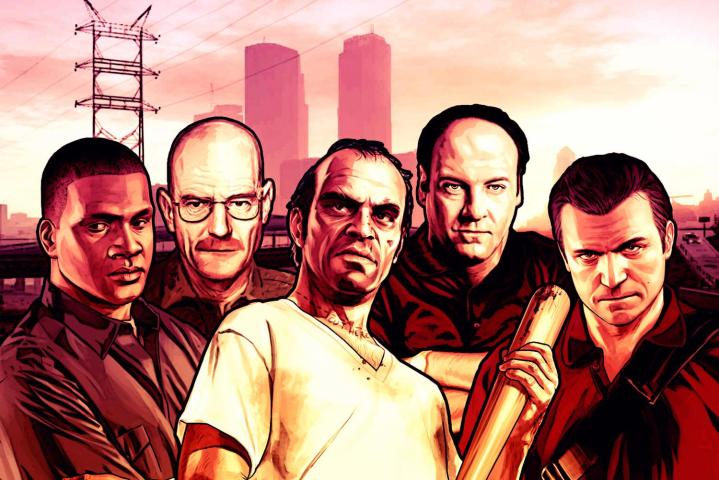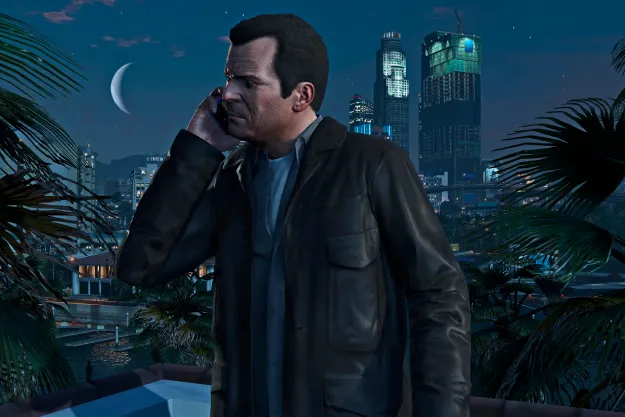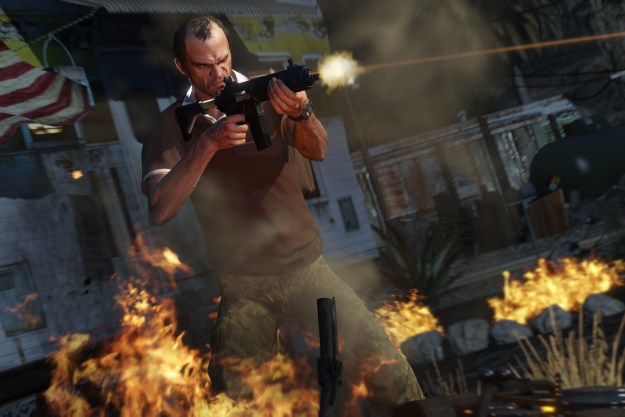
NOTE: This is a critical look at the story in Grand Theft Auto V. If you haven’t played the game and want to remain unspoiled, take note before you read any further. There’s no discussion of major plot revelations, but there’s plenty of general talk about the characters and their development over the course of the story.
The latest Video Game Controversy on the Internet concerns Grand Theft Auto V and its lack of strong female characters. Many even think it’s fair to rail on writer Dan Houser for not making the creative choice to deliver a playable female protagonist. Some chalk the weak supporting cast – male and female alike – up to satire. Others just wish the angry people would shut up and enjoy the game. Wherever you fall in these arguments, GTA V is exactly the game it was conceived to be. If you want something different, go make your own game, or play one that falls more in line with your sensibilities.
Walter White is relatable because he’s done it all for his family.
All of this talk about characters and characterizations in the game does raise a discussion-worthy question, however. How does GTA V fit in alongside established anti-hero fiction? Do we root for Franklin, Michael, and Trevor the way that we do for, say, Breaking Bad’s Walter White? Do we want them to “win” because we relate to them in some real way, as we do with Walt – he just wants to protect his family, after all – or is it simply because they serve as our avatars in Rockstar’s gorgeous virtual world?
Grand Theft Auto V tells a story about three dudes who steal shit, and it doesn’t aspire to be much more than that. It’s Heat – Michael Mann’s 1995 heist flick known primarily for its unrequited bromance between Robert DeNiro and Al Pacino – rendered as a video game. If you like, you can draw lines of relativity between the three anti-hero stars and any number of other examples drawn from popular anti-hero fiction. Walter White. Travis Bickle. Omar Little. Tyler Durden. Tony Soprano.
It’s an illusion though. Franklin, Michael, and Trevor are shaped to varying extents by the people arrayed around them, but it’s ultimately a paper-thin supporting cast. The baggage that we bring along as gamers colors our connection with the protagonists to some extent, but what’s lacking – and this is what naysayers on the web are circling around, even if they don’t realize it – are the deep interpersonal relationships that help to define a character.

Walter White is a monster because of what he’s done to his family, but he’s relatable because he’s done it all for his family. His wife Skyler is a very necessary foil; part-antagonist, part-sympathetic figure, she sticks with Walt again and again, and through her we gain a clearer understanding of Walt’s character. As much as he’s responsible for his own actions, he’s also defined by his relationship with Skyler. Who is Tony Soprano without Carmela? Would Travis Bickle have gone to the lengths that he did if he’d never met Iris?
There aren’t any analogous supporting characters in GTA V for our protagonists. Instead we have one-dimensional relationships that are either played for laughs or left unexplored. Franklin pines for recent ex Tanisha from pretty much the first moment we meet him. It’s a tenuous plot thread that comes up again and in text messages and emails. These communiqués create the illusion of choice – each message prompts the player to choose a response, but there’s only ever one option available – they mostly exist to color in Franklin’s back story.
Michael is less problematic in the sense that the player spends ample amounts of time with his family. Wife Amanda is a shrill, philandering nag. She’s unhappy with her husband and she’s not afraid to let him know, yet she’s also constantly doing everything in her power to wreck her marriage. Any depth there may be for Amanda’s character is lost in her “angry wife” caricature.

Michael’s two children are just as broadly defined, veering into the same one-dimensional territory that Amanda does. Jimmy is a stereotypical troll gamer, as we are frequently reminded whenever we see him in a cutscene spewing hateful chatter into a gamepad-connected headset. Tracey, on the other hand, is a wannabe movie star who believes that slutting it up is her key to success.
All three of these people are cartoon characters, flat archetypes played for laughs and little more. No one evolves or grows or learns from their mistakes. You’re not rushing off to save Jimmy from kidnappers because you care; you’re doing it because there’s a little marker on the minimap that tells you where your next objective is. There’s no meaningful connection. When the whole family falls apart midway through the story and then reunites later after a quick trip to the shrink’s office, the reconciliation feels unearned.
Oddly, it is Trevor, the most cartoonish of the three protagonists with his over-the-top behavior and penchant for extreme violence, that cultivates the most meaningful relationship in GTA V. In so doing, he becomes the game’s most fully realized character. Midway through the story, Trevor kidnaps Patricia Madrazo, the dissatisfied wife of a drug cartel heavy. What starts as a hostage situation turns into a bizarre, confused courtship.
GTA V’s narrative shortcomings don’t equate to a failure; the game is wildly satisfying to play…
Trevor’s infatuation with Patricia is played as a comically tragic crush. He becomes downright tender around her, a sharp turn away from his typically wild ravings and rash antics. Their strong feelings for one another are ultimately overridden by Patricia’s belief in the sanctity of marriage. She admits to having strong feelings for Trevor, but she won’t leave her husband to act on them.
To Patricia, Trevor is an overprotective lapdog whom she quickly tames and exercises a measure of control over. Trevor, for his part, is happy to cede that control even when it goes against his nature, as we see in their phone, email, and text exchanges. It’s an unexpected turn for this strongly independent character, but the story sells it… to an extent.
Notably, this particular example of effective characterization is largely built on the foundations of GTA V’s gameplay. Trevor is by far the most volatile of the three protagonists, and many of his missions in the game support this. Typically, antihero love stories help us to empathize with the character, but this one largely exists to comically juxtapose Trevor’s inherent violence with his puppy love for Patricia.
There’s a tendency among GTA’s staunchest defenders to cry satire as the explanation for perceived narrative deficiencies. Indeed, Rockstar Games has built up a reputation over the years for delivering sharply satirical stories that tease humor out of broad stroke generalizations. And it’s not like GTA V’s narrative shortcomings equate to a failure; the game is wildly satisfying to play, as many reviews have pointed out.

This is where we find the principal disconnect. Everyone brings different baggage to any work of entertainment, but video games are unique in the sense that the consumer gets to imprint some of him or herself on the finished work. GTA V’s three protagonists recite lines from a script, but they are equally colored by your own, completely unscripted behavior. Is it even possible to establish a video game analog for Skyler White in a game that offers as much freedom as Grand Theft Auto?
Franklin, Michael, and Trevor are one-dimensional knuckleheads, but they’re your one-dimensional knuckleheads. You identify with them because you are them, in a manner of speaking. As much as that’s fundamental to any story-driven video game, it’s also part of the problem. If all GTA games boil down to power fantasies, what does it mean for their playable characters if the person holding the controller feels queasy about a scripted emphasis on cold-blooded murder? It’s not like you can simply make the choice that Trevor isn’t going to be a nutball anymore.
Grand Theft Auto V is a monumental achievement in world-building even as Rockstar still struggles to strike a fulfilling balance between satire and emotionally resonant storytelling. The studio continues to successfully lean on exploration and set piece-driven action, delivering what amounts to the purest definition of “blockbuster”: an expertly constructed work of spectacle with sky-high presentation values and skin-deep plot development. As a video game for the masses, it’s a rousing success. As an interactive narrative though… it’s Heat in an era when audiences are screaming for more Breaking Bad.
Editors' Recommendations
- GTA 5 cheats: codes and phone numbers PS4, PS5, Xbox, and PC
- How to sell cars in GTA 5
- The hacker who leaked Grand Theft Auto VI has been sentenced
- First Grand Theft Auto 6 trailer takes players back to Vice City
- Grand Theft Auto 6 trailer: when it’s coming and how to watch


